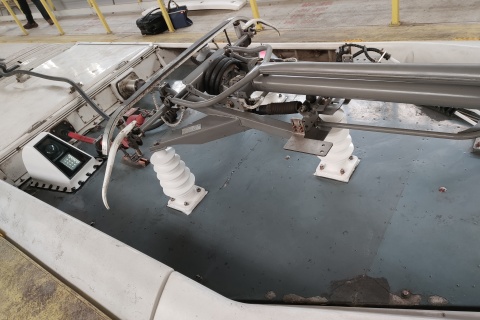
- Home
- >
- Resources
- >
- Industry Knowledge
- >
Resources
In modern railway operations, train monitoring systems are no longer optional but essential for ensuring safety, improving operational efficiency, and reducing long-term costs. These systems, including Automatic Train Supervision (ATS) and Communication-Based Train Control (CBTC), offer real-time monitoring and predictive maintenance capabilities that help railway operators prevent accidents, optimize scheduling, and anticipate mechanical failures. By providing continuous data on train conditions and infrastructure, train monitoring systems enable more effective management of rail networks, allowing for smoother operations and increased capacity. The integration of these advanced technologies enhances the overall safety and reliability of railway services, making them indispensable tools for modern rail transport.
China’s high-speed rail network is a global leader in both speed and stability, achieving record-breaking velocities while ensuring passenger comfort. But how do Chinese high-speed trains maintain such exceptional performance? The answer lies in cutting-edge intelligent monitoring systems that ensure not only the safety and stability of the train, but also enhance operational efficiency. In this article, we will explore two essential technologies that make high-speed trains both fast and stable: the Pantograph Video Monitoring System and the On-board Stability Monitoring System. These innovations are the backbone of modern rail transport, contributing to the remarkable success of China’s rail network and paving the way for the future of global railway operations. Whether you’re an engineer, a system integrator, or a railway operator, understanding these technologies will give you insights into the future of safe, efficient, and high-speed rail travel.
Ensuring uninterrupted power for train onboard video surveillance systems is critical for maintaining passenger safety and operational efficiency. This article explores the main power supply methods, including train-mounted batteries, centralized power systems, point-to-point setups, and Power over Ethernet (PoE) technology. It discusses how each solution addresses the challenges of railway environments, such as voltage fluctuations, electromagnetic interference, and physical vibrations. Additionally, DC-DC converters are highlighted as essential for stabilizing voltage and protecting sensitive equipment. By leveraging the right combination of these technologies, railway operators can ensure reliable and efficient surveillance operations.
This article explores the integration of train-borne video surveillance systems with other key on-board technologies, such as train control systems (TCMS), passenger information systems (PIS), and artificial intelligence (AI). It delves into the methods of seamless system integration, including the use of data transmission protocols like 5G and MVB, the role of unified management platforms for centralized monitoring, and the significant impact of AI on real-time analysis and predictive maintenance. By highlighting the challenges of integrating legacy systems and the benefits of modern technologies, the post emphasizes how an integrated approach can enhance railway safety, operational efficiency, and real-time decision-making.
Locomotive video surveillance systems represent a transformative advancement in railway safety and operational management. By leveraging cutting-edge technologies such as high-definition CCTV cameras, AI-driven analytics, and 5G connectivity, these systems provide comprehensive, real-time monitoring of both the interior and exterior of trains. Through intelligent video analysis, potential safety threats, such as unauthorized access, fire hazards, or mechanical issues, are detected instantly, allowing for immediate intervention. The integration of AI enhances predictive capabilities, enabling proactive risk management and operational optimization. Additionally, seamless 5G-powered data transmission ensures uninterrupted communication across high-speed rail networks. These systems not only improve passenger and crew safety but also contribute to the overall efficiency of railway operations by identifying patterns for better maintenance scheduling and reducing response times in emergencies. As the railway industry continues to embrace digital innovation, locomotive video surveillance systems are positioned to play a central role in reshaping safety standards and operational protocols.
This article provides an overview of the top ten train manufacturing bases in China, highlighting each company’s history, main products, location, and their influence on domestic and international markets. These companies have achieved significant milestones in high-speed trains, electric locomotives, and urban rail vehicles, driving the global rail industry forward with innovative technology and large-scale production. The article also touches on each company’s export activities and their competitive edge in the international railway equipment market. By offering detailed profiles of these manufacturing bases, readers gain a comprehensive understanding of China’s leading railway equipment manufacturers and their global impact.
In today's rapidly evolving world of transportation technology, staying updated with the latest advancements is crucial. One significant upgrade is the implementation of advanced CCTV technology on trains. This technology not only enhances security and safety but also revolutionizes the management and operational capabilities of railway systems.
The modern railway system necessitates robust security measures to ensure the safety and efficiency of its operations. Onboard CCTV solutions have emerged as indispensable tools in this regard, offering real-time surveillance, incident documentation, and deterrence against unlawful activities. Selecting the right CCTV solution involves evaluating several critical factors, including image quality, system durability, technological innovation, and customer support. This article explores the top five companies renowned for their onboard CCTV solutions tailored for locomotives.
In the evolving landscape of public transportation safety and efficiency, Closed-Circuit Television (CCTV) in-train surveillance systems are playing a pivotal role. These systems are designed to enhance security, improve operational efficiency, and ensure passenger safety on rolling stock, including trains and trams.
In an era where passenger safety and operational efficiency are paramount, on-train Closed-Circuit Television (CCTV) systems have emerged as a critical component of modern railway operations. These advanced surveillance systems offer far more than mere passenger safety; they are a cornerstone in the technological advancement of railway systems worldwide.
A pantograph camera is used for monitoring the condition and performance of pantographs on electric trains, trams, or electric buses. Pantographs are the apparatus mounted on the roof of these vehicles that collect power from overhead lines. The camera systems are designed to: Monitor Pantographs in Real-Time: They provide continuous surveillance of the pantograph's condition, checking for proper positioning, sparking, and other potential issues that could lead to damage or malfunction
As the world becomes more interconnected, the need for reliable and efficient transportation systems is more crucial than ever. One key player in this domain is the onboard CCTV system for rolling stock, a vital component for ensuring safety and security in the railway industry. In this post, we'll explore the top 5 companies in India that are making significant strides in this field.












